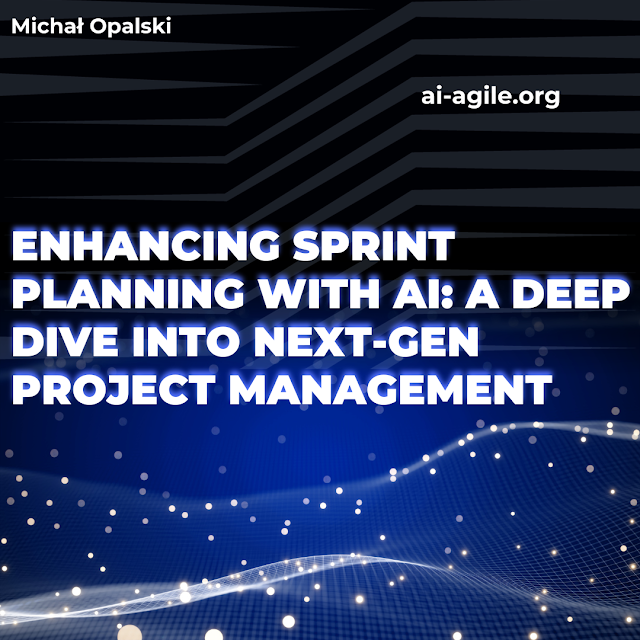Enhancing Sprint Planning with AI: A Deep Dive into Next-Gen Project Management - Michał Opalski / ai-agile.org
In the domain of agile software development, sprint planning has long been recognized as a crucial phase that dictates the success of an entire project. It involves intricate decisions about which tasks should be included in the next sprint, estimating effort required, and then assigning these tasks to team members. As with many aspects of modern industry, advancements in Artificial Intelligence (AI) now offer ways to streamline and optimize this process. By harnessing AI, teams can improve their sprint planning by predicting completion rates and allocating tasks based on individual expertise.
Using AI to Predict Sprint Completion Rates
One of the most fundamental issues during sprint planning is accurately predicting how many tasks (or user stories) a team can complete within the sprint. Traditional methods involve a combination of team member input, historical data, and manual calculations. The challenge here is the unpredictability of software development tasks. Issues arise, requirements evolve, and team dynamics shift, leading to inaccuracy in completion predictions.
1. Historical Data Analysis
AI thrives on data. Past sprints, with their successes and challenges, become a gold mine of information. By training an AI model on historical data, patterns begin to emerge. Such patterns might be invisible to the human eye but can be discerned by machine learning algorithms. The AI can identify trends related to task complexity, team member involvement, and past completion rates to predict future outcomes more accurately.
For instance, if historically a team consistently underestimates the effort required for certain types of tasks, the AI can adjust future estimates accordingly. Over time, these predictions will become more accurate, ensuring teams don’t overcommit or undercommit during sprint planning.
2. Real-time Adjustment
AI models don't just sit idle after their initial training. They can be designed to learn continuously. As the sprint progresses, the model can adjust its predictions based on real-time data. For instance, if a key team member falls ill or a task turns out to be more complex than initially thought, the AI can recalibrate the sprint's predicted completion rate. This provides teams with more dynamic feedback, enabling better decision-making mid-sprint.
How AI can Assist in Assigning Tasks Based on Team Member Expertise
Task allocation is another critical facet of sprint planning. The right person for the job can be the difference between task completion and lingering delays. Traditionally, task assignment is based on a mix of perceived expertise, past experience, and sometimes even guesswork. AI offers a systematic and evidence-based approach to this challenge.
1. Skill Mapping
AI can help in creating a dynamic skill map of every team member. By analyzing past tasks, feedback, code quality, and other pertinent factors, AI can deduce a fairly accurate skill profile for each developer or team member. For instance, a developer might be exceptionally good at front-end tasks but not as efficient with back-end development. Recognizing such nuances can be invaluable during task allocation.
2. Predictive Analysis for Optimal Allocation
Using the skill map, AI can predict the best task for each individual. It will consider the current sprint's requirements and compare them with the team's expertise. This matching process ensures that tasks are assigned to individuals most likely to complete them efficiently and effectively.
3. Continuous Learning and Feedback Loop
As with sprint completion rate predictions, the AI model benefits from a feedback loop. As tasks are completed, the model refines its understanding of each team member’s strengths and weaknesses. This continuous learning ensures that the task assignment remains optimal over multiple sprints.
Conclusion
The integration of AI into sprint planning offers transformative possibilities. By enhancing our ability to predict sprint completion rates and optimizing task allocation based on expertise, AI ensures a more efficient, dynamic, and results-oriented sprint planning process. While the human element of understanding context, team dynamics, and interpersonal relationships remains irreplaceable, AI serves as a powerful tool to augment human decision-making.
As AI models become more sophisticated and are fed with richer data sets, their predictive accuracy and utility in sprint planning will only increase. Organizations that leverage this AI-driven approach will position themselves at the forefront of agile software development, achieving better outcomes and fostering a more efficient, harmonious, and productive development environment.


